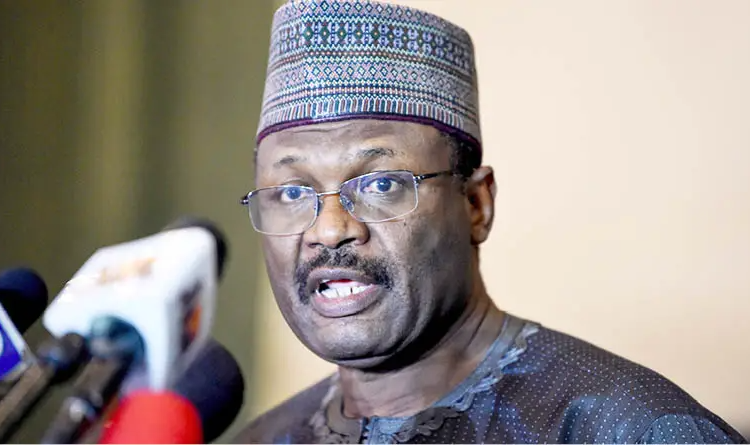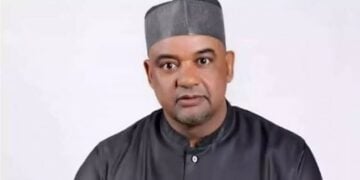The Independent National Electoral Commission (INEC) has said that while Nigerians expected it as registrar and regulator of political parties to act in the face of the brazen breach of the law on early campaigns by politicians and their foot soldiers, the commission was being constrained by law to act against violators accordingly.
The chairman of INEC, Professor Mahmood Yakubu, disclosed this at a stakeholders roundtable convened to examine ‘The Challenges of Premature Political Campaigns’ in Abuja on Wednesday.
He said while Sections 94(2) of the Electoral Act 2022 imposes sanctions, albeit mild (a maximum amount of N500,000 on conviction), on any political party or a person acting on its behalf who engaged in campaigns 24 hours before polling day, there is no sanction whatsoever concerning breaches for campaigns earlier than 150 days to an election.
LEADERSHIP reports that politicians and their supporters have ignored earlier warnings from INEC and continued to engage in subtle campaigns for the 2027 general election, which is more than 150 days ahead.
For instance, the ruling All Progressives Congress (APC) had adopted President Bola Tinubu as its sole presidential candidate after endorsements from the party’s highest decision-making organ, the National Executive Committee (NEC), zonal and state caucuses.
Also, the presidential candidate of the Labour Party (LP) in the 2023 election, Peter Obi, had confirmed he will contest the 2027 presidential election with a promise to serve a single four-year term if elected.
Similarly, a former Minister of Transportation, Chibuike Amaechi, has declared intention for the presidency with the confidence to defeat President Tinubu in the 2027 presidential election if he secure the ticket of the ADC.
INEC chairman Yakubu said Section 94(1) of the Electoral Act 2022 prohibits the commencement of campaign earlier than 150 days (i.e. 5 months) before polling day and must end 24 hours prior to that day.
He said the idea is to prioritise governance over electioneering from one electoral cycle to another,
however, political parties, candidates and their supporters seemed to be perpetually in election mood even when the electoral body was yet to release the Timetable and Schedule of Activities for elections or ahead of the timeframe provided by law.
“Around the country, we have seen outdoor advertising, media campaigns and even rallies promoting various political parties and candidates. These actions and activities undermine the Commission’s ability to track campaign finance limits as politicians, prospective candidates and third-party agents expend large amount of money that cannot be effectively monitored before the official commencement of campaigns.
“Quite correctly, Nigerians expect INEC, as registrar and regulator of political parties, to act in the face of the brazen breach of the law on early campaign. However, the major challenge for the Commission is the law itself.
“Sections 94(2) of the Electoral Act 2022 imposes sanctions, albeit mild (a maximum amount of N500,000 on conviction), on any political party or a person acting on its behalf who engaged in campaigns 24 hours before polling day.
“However, there is no sanction whatsoever concerning breaches for campaigns earlier than 150 days to an election. Here lies the challenge for the Commission in dealing with early campaign by political parties, prospective candidates and their supporters.
“In a sense, the problem of early campaign in Nigeria is not new. The seeming inability of the Commission and other regulatory agencies to deal with the menace within the ambit of the existing electoral legal framework calls for deep reflection.
“It is in this context that the Commission considered it appropriate to convene this meeting in which legislators, leaders of political parties, civil society organisations, experts, practitioners and regulators will brainstorm on the way forward.
“As the National Assembly is currently reviewing our electoral laws, the Commission has also invited the leadership of both the Senate and House of Representatives Committees on Electoral Matters. I am confident that they will give due consideration to actionable recommendations by experts, leaders of political parties, the President of the Nigerian Bar Association (NBA), the Broadcasting Organisation of Nigeria (BON), the National Broadcasting Commission (NBC) which regulates the broadcast media and the Advertising Regulatory Council of Nigeria (ARCON) which regulates advertisement, including outdoor advertising.
“Let me again reiterate the Commission’s strong belief that protecting our electoral process and consolidating our democracy is a multi-stakeholder task. I am confident that the Keynote Address and the panel discussions will provide insights into the problems of early campaigns and the measures necessary to address the challenge,” he added.
In his welcome remark, INEC national commissioner and Chairman, Board of The Electoral Institute (TEI), Prof. Abdullahi Zuru, said one of the most worrying challenges of democracy in Nigeria was the increasing resort to early campaigns by political actors and their surrogates in many forms.
“We have seen aspirants use cultural festivals and religious gatherings to drop hints about their ambitions, often disguised as appreciation or philanthropy. Billboards and branded vehicles sometimes appear with cleverly crafted slogans that stop just short of open solicitation but leave little doubt about the intent.
“More recently, social media influencers and content creators have become key players and fronts, flooding platforms such as Facebook, Instagram, Tik-Tok, YouTube, and X with songs, skits, and hashtags that project particular aspirants many months before the permission of the law.
“The Electoral Act 2022 is clear on this matter. Section 94.—(1)”for the purpose of this act, the period of campaigning in public by every political party shall commence 150 days before polling day and end 24 hours prior to that day.
“This safeguard was introduced to ensure fairness, reduce political tension, and guarantee a level playing field for aspirants. Unfortunately, what we see today is an increasing determination to circumvent, stretch, and even undermine this law. Often, third-party actors such as associations, professional groups, religious groups or political support groups are used as convenient fronts for disguised early campaigning,” he said.
According to him, the implications of this trend are far-reaching as when aspirants or parties compete to dominate visibility long before the official campaign period, it distorts fairness and raises the cost of political competition.
“Moreover, It distracts from governance, as elected officials become more concerned with sustaining political relevance than delivering public service. Over time, it erodes public confidence in our electoral system and fuels cynicism about whether the law can truly be enforced.
“We must be frank in acknowledging the scale of the challenge and bold in designing solutions. We must refine the regulatory framework so that what constitutes premature or early campaigning is more clearly defined in today’s digital age. We must strengthen enforcement, ensuring that violations are detected early and sanctioned firmly, be it by political parties, individuals, or their proxies,” Zuru said.





